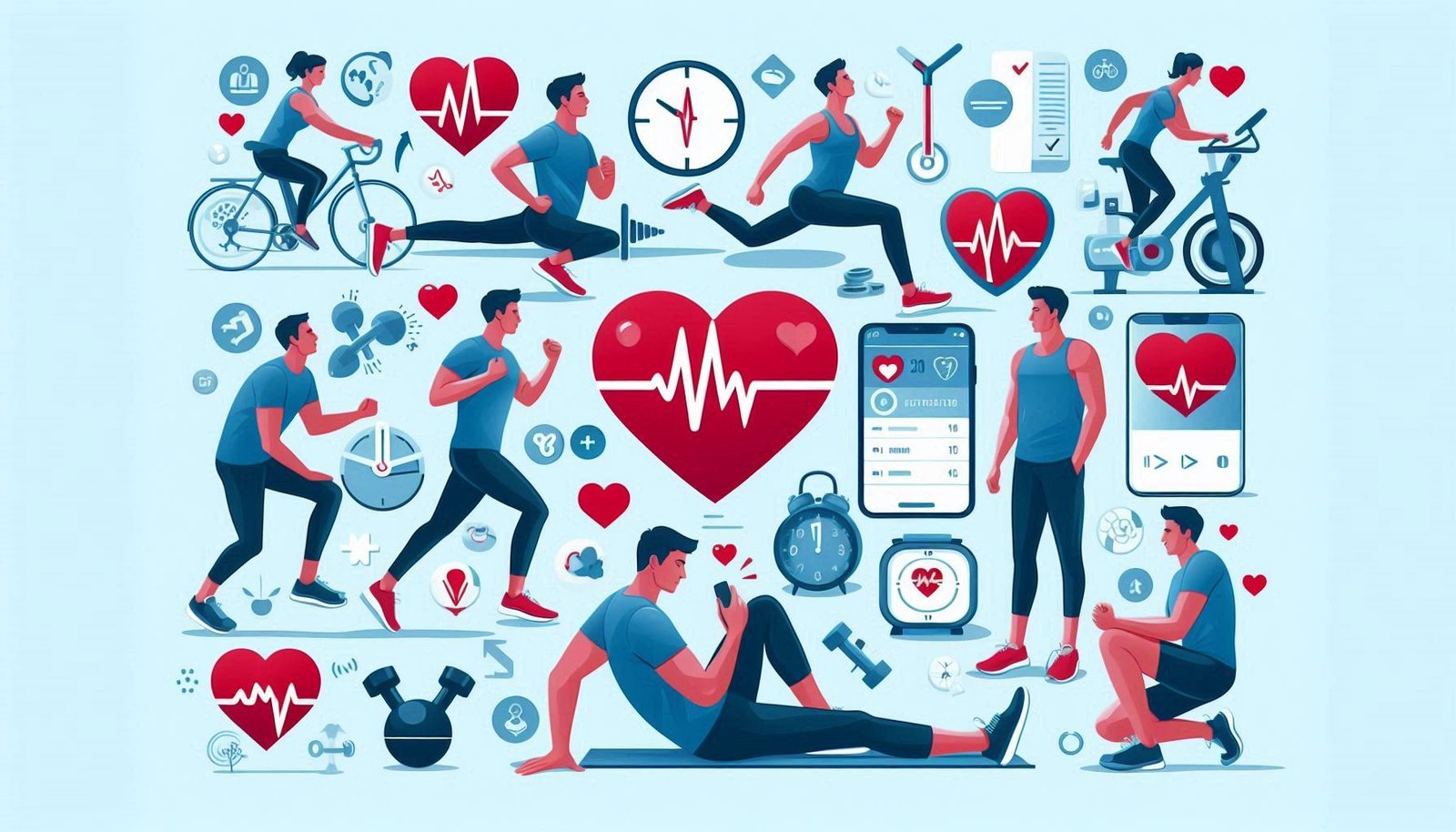Exercise for Heart Health: 15 Tips to Prevent Heart Attack Complications and Boost Well-Being
Regular exercise is crucial for strengthening heart health, reducing the risk of heart attack complications, and improving overall well-being. This guide offers practical exercise tips tailored to individuals focusing on heart health, including safe routines, intensity guidelines, and recommendations for gradual progress. Learn how incorporating aerobic, strength, and flexibility exercises into your routine can support cardiovascular health, promote recovery, and enhance your quality of life. Whether you’re just starting or maintaining a fitness plan, these tips are designed to keep your heart in top condition.
Exercise for Heart Health: 15 Tips to Prevent Heart Attack Complications and Boost Well-Being: 1. Start with a Warm-Up, 2. Focus on Aerobic Exercises, 3. Incorporate Strength Training, 4. Don’t Forget Flexibility and Balance Exercises, 5. Monitor Your Intensity with the Talk Test, 6. Listen to Your Body, 7. Stay Consistent, 8. Stay Hydrated, 9. Include Rest Days, 10. Cool Down Properly, 11. Use Heart Rate Monitors if Advised, 12. Choose Enjoyable Activities, 13. Stay Active Throughout the Day, 14. Consider Cardiac Rehabilitation, 15. Consult Your Doctor Before Starting
Exercise plays a vital role in improving heart health, reducing the risk of heart attack complications, and enhancing overall well-being. Here are some exercise tips tailored for individuals who are focusing on heart health:
1. Start with a Warm-Up
– Why: Warming up gradually increases your heart rate and prepares your muscles, reducing the risk of injury.
– How: Spend 5-10 minutes doing light activities like walking, arm circles, or gentle stretching.
2. Focus on Aerobic Exercises
Aerobic exercises are the most beneficial for heart health because they improve circulation, lower blood pressure, and help maintain a healthy weight.
– Examples: Brisk walking, cycling, swimming, jogging, dancing, and low-impact aerobics.
– Frequency: Aim for at least 150 minutes of moderate-intensity aerobic exercise per week, or 30 minutes most days of the week.
– Intensity: You should be able to talk but not sing during the activity (moderate intensity).
3. Incorporate Strength Training
Strength training helps build muscle, boost metabolism, and improve your body’s ability to use insulin, which is particularly beneficial for heart health.
– Examples: Bodyweight exercises (like squats, push-ups, lunges), resistance bands, light free weights, or machines.
– Frequency: Perform strength training exercises 2-3 times a week, with at least one rest day between sessions.
– Reps and Sets: Start with 1-2 sets of 10-15 repetitions of each exercise.
4. Don’t Forget Flexibility and Balance Exercises
Flexibility and balance exercises enhance overall fitness, improve posture, and reduce the risk of falls, especially in older adults.
– Examples: Stretching, yoga, and tai chi.
– Frequency: Include these exercises 2-3 times a week, or as part of your warm-up or cool-down routine.
5. Monitor Your Intensity with the Talk Test
– Moderate Intensity: You should be able to talk comfortably while exercising.
– Vigorous Intensity: You may only be able to speak a few words without needing to pause for breath.
6. Listen to Your Body
Pay attention to how you feel during exercise, especially if you have heart-related conditions.
– Stop if You Feel: Dizziness, chest pain, shortness of breath, or extreme fatigue. Seek medical advice if these symptoms occur.
– Modify as Needed: Adjust intensity or duration based on how you’re feeling. It’s okay to do less on days when you feel tired or unwell.
7. Stay Consistent
Consistency is key for long-term benefits.
– Schedule Your Workouts: Set a regular time each day to make exercise a habit.
– Start Slow: If you’re new to exercise or returning after a break, start with shorter sessions (10-15 minutes) and gradually increase your time and intensity.
8. Stay Hydrated
– Before, During, and After Exercise: Drink water to stay hydrated, especially if you’re exercising in warm weather or for extended periods.
9. Include Rest Days
Allow your body time to recover, especially after intense workouts. Rest days help prevent overtraining and reduce the risk of injury.
10. Cool Down Properly
– Why: Cooling down helps your heart rate and breathing return to normal gradually, which can prevent dizziness.
– How: Spend 5-10 minutes doing light walking or stretching after your workout.
11. Use Heart Rate Monitors if Advised
A heart rate monitor can help ensure you’re exercising within a safe and effective range. Consult with your healthcare provider for the ideal target heart rate based on your health status.
12. Choose Enjoyable Activities
Pick exercises you enjoy to increase the likelihood of sticking with your routine. Group classes, dancing, or outdoor activities like hiking can add variety.
13. Stay Active Throughout the Day
– Take the Stairs: Instead of the elevator.
– Walk More: Park farther away, or take short walking breaks.
– Active Hobbies: Gardening, cleaning, or playing with pets are great ways to stay moving.
14. Consider Cardiac Rehabilitation
If you have had a heart attack or heart surgery, participating in a supervised cardiac rehabilitation program can provide tailored exercise advice, monitoring, and support.
15. Consult Your Doctor Before Starting
Especially if you have a history of heart problems, discuss your exercise plan with your healthcare provider to ensure it’s safe and suitable for your specific needs.
By incorporating these exercise tips into your daily routine, you can significantly improve your heart health, boost energy levels, and reduce the risk of heart complications. Start at your own pace and gradually build up to more challenging workouts as your fitness improves.
https://en.wikipedia.org/wiki/Heart#Heart_rate
https://optimalhealth24.com/13-prevention-tips-for-heart-attack/






